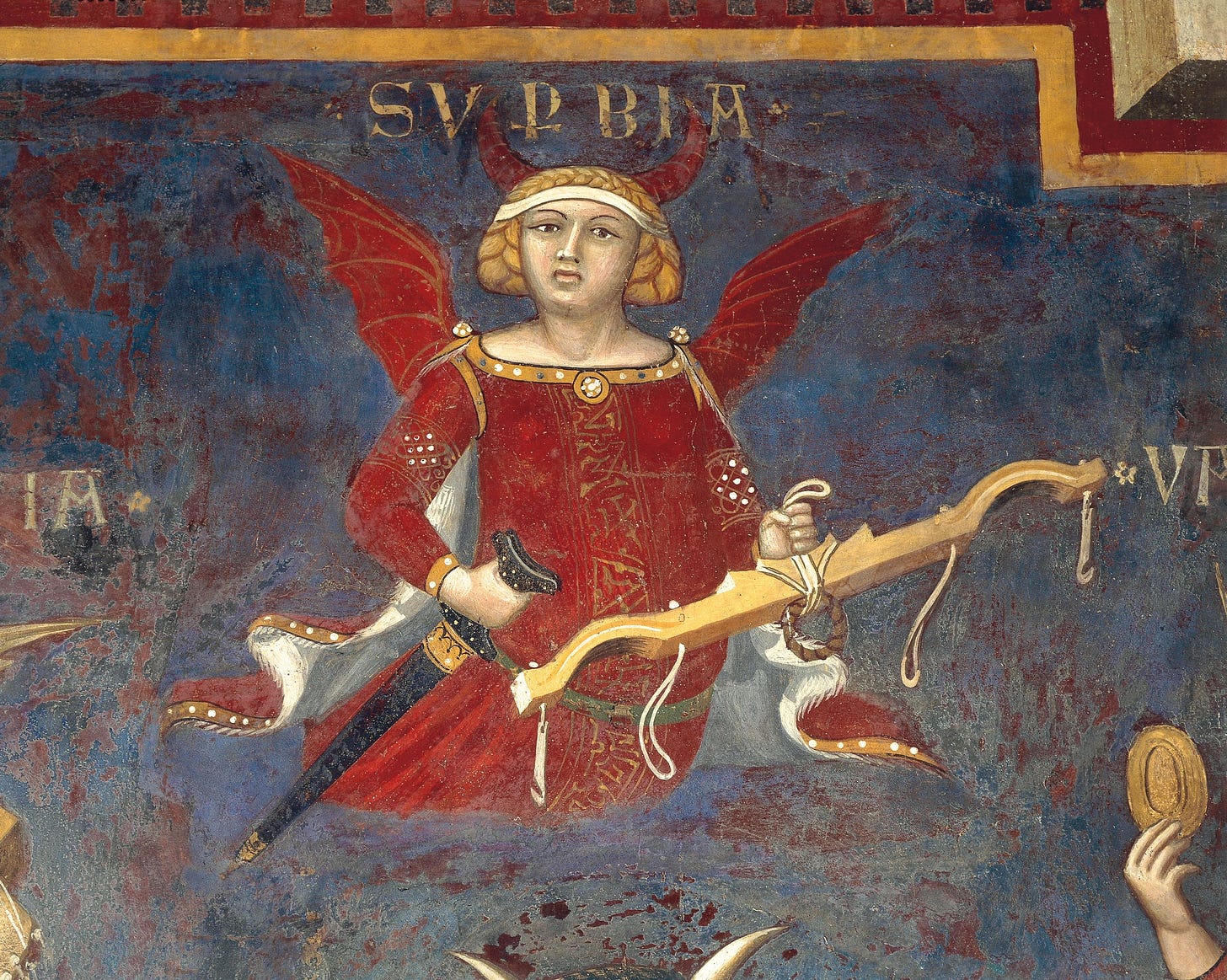St. Francis de Sales on God's Wake Up Call
And Some Brief Reflections on the Indictment of Former President Trump
These days I am making my way through St. Francis de Sales’s Treatise on the Love of God, a massive tome much denser than his more popular Introduction to the Devout Life. Published in 1616, the book addresses in painstaking detail the nature of the human soul’s love for God and its eventual union with God’s love, a topic of great interest in the seventeenth century, although the finer points of which may seem obscure to contemporary readers.
In the earlier sections of the book, however, de Sales discusses more familiar themes such as divine providence and the relationship between grace and the human will, topics that had been discussed at the Council of Trent a few decades earlier. In the midst of these discussions, I came across a delightful image de Sales uses to describe God’s desire for us to cooperate with grace and our ability to freely choose to refuse to do so (those who have read de Sales’s Introduction to the Devout Life know that he is unparalleled in his ability to create down-to-earth images for theological concepts). In this passage, de Sales is explaining that God first offers us grace without our cooperation, but then calls us to cooperate with it:
[W]hen it is said that we have power to reject the divine inspirations and motions, it is of course not meant that we can hinder God from inspiring us or touching our hearts, for as I have already said, that is done in us and yet without us. These are favours which God bestows upon us before we have thought of them, he awakens us when we sleep, and consequently we find ourselves awake before we have thought of it; but it is in our power to rise, or not to rise, and though he has awakened us without us, he will not raise us without us. Now not to rise, and to go to sleep again, is to resist the call, seeing we are called only to the end we should rise. We cannot hinder the inspiration from taking us, or consequently from setting us in motion, but if as it drives us forwards we repulse it by not yielding ourselves to its motion, we then make resistance.
For me, de Sales’s image of God’s grace evokes a parent who wakes up their child and continues to offer them encouragement as they get dressed and ready for school. But the child has the freedom to resist, pull up the covers, and try to go back to sleep.
I will admit, this is a difficult image for me because sometimes I was that child who didn’t want to get out of bed, and I still have issues with sleep—as a night owl, I enjoy staying up late, but then have difficulty waking in the morning (I won’t tell you what time I am writing this!). I think de Sales’s point is less about when we get up (although he does recommend being an early riser in the Introduction to the Devout Life), and more about being alert and responsive to God’s call. The image reminds me of Jesus’ parable of the Ten Virgins who fall asleep waiting for the bridegroom, but only five are prepared with oil for their lamps when they awake and the bridegroom arrives (Mt. 25:1-13).
Some readers might notice that there is a similarity between de Sales’s image of the awakening sleeper and the very different image of the sun used by some medieval Franciscan theologians that I highlighted in this newsletter a few weeks ago. For example, I wrote:
The thirteenth-century Franciscan theologian John of La Rochelle [explains] that just as someone must open the windows for the sun’s light to enter a room, we must remove the obstacles to grace in our life to allow God’s grace to transform us. … Just as it is the sun that dispels the darkness, even if it in a sense depends on us to open the window, likewise God offers us grace, but we must dispose ourselves to receive it.
The theology behind this image of sunlight shining through a window found its way into the Council of Trent’s Decree on Justification, and de Sales picks it up from there. For example, elsewhere in the Treatise, he writes:
[T]he sacred Council of Trent divinely inculcates upon all the children of holy Church, that the Grace of God is never wanting to such as do what they can, invoking the divine assistance; that God never abandons such as he has once justified unless they abandon him first; so that, if they be not wanting to grace [i.e., if they do not fall short in their cooperation with grace, by sinning] they shall obtain glory.
Appropriately enough, de Sales follows this passage with an image of the sun, although not one of sunlight passing through a window, but rather one combining the symbol of the sun with the earlier image of sleepers:
Some travelers, one summer’s day about noontide, lay down to repose under the shade of a tree, but while their weariness and the coolness of the shadow kept them asleep, the sun advancing on them threw just upon their eyes his strongest light, which by its glittering brightness gave glimpses of itself like little flashes of lightning about the pupils of these sleepers’ eyes, and by the heat which pierced their eyelids, forced them by a gentle violence to awake. Some of them being awakened get up, and making way get happily to their lodging, the rest not only do not rise, but turning their backs to the sun and pressing their hats over their eyes, spend their day there in sleeping, till surprised by night and yet being desirous to make towards their lodging, they stray, one here, one there, in the forest, at the mercy of the wolves, wild-boars, and other savage beasts. …
What is there, miserable beings, that the sun could really do for you and did not? His favours were equal to all ye that slept: he approached you all with the same light, touched you with the same rays, spread over you a like heat, but unhappy ye, although you saw your risen companions take their pilgrim’s staff to gain way, ye turned your backs to the sun and would not make use of his light, nor be conquered by his heat.
Like the earlier Franciscans, here de Sales emphasizes both the universality of God’s love and the need for us to receive and cooperate with it. He likewise makes the case that God’s love never fails, neither in abundance nor in sufficiency, but rather we create obstacles to receiving it or resist its working within us.
I think here, and elsewhere in the Treatise, de Sales shows himself to be a profound theologian, although writing in a pastoral and mystical style quite different from that of the scholastic theologians of his day (de Sales was a somewhat younger contemporary of Francisco Suarez and Robert Bellarmine, for example). Through his spiritual writings, de Sales had a lasting influence on the Church’s thinking and later religious movements, but his role in the Church’s theological development has been mostly neglected. Here in these passages, however, we can see him picking up aspects of the earlier Franciscan theological tradition and interpreting them in light of the more recent teachings of Trent.
Brief Reflections on the Indictment of Former President Trump
And now, as Monty Python used to say, for something completely different. As readers surely know by now, the former U.S. president Donald Trump has been indicted by the district attorney in Manhattan on charges of business fraud, at least partly related to hush money payments made to a porn star during the 2016 presidential campaign and passed off as legal expenses (the exact charges are unknown at the time I am writing this). This is the first time a former U.S. president has been charged with a crime.
Obviously this is primarily a legal and political issue, but is it also a theological issue? I feel like I can’t ignore such an event in a newsletter that promises to provide commentary on current events from a Catholic theological perspective. Of course, many of Trump’s most radical supporters see him in theological terms, as a savior figure chosen by God, even a “King Cyrus” who will save God’s faithful people, despite his own pagan ways (a convenient biblical metaphor, given Trump’s lifestyle). Even without the over-the-top imagery, other supporters might have seen Trump’s presidency as a blessing for the nation and for Christian religious believers.
Far from seeing him as a savior, I think the evidence is clear that Trump has left a trail of criminal behavior throughout his business career, and as president engaged in unprecedented abuses of power for which he has so far escaped accountability, in part because of his manipulation of the Department of Justice while it was under his control. These abuses of power and Trump’s polarizing political tactics have damaged the fabric of our democratic institutions, although, to an extent, Trump is a symptom of long-festering pathologies in our political culture rather than their cause.
The fundamental issue at stake now that Trump has been criminally charged (and possibly faces more serious charges related to the plot to overturn the 2020 elections, both from Georgia prosecutor Fani Willis and Special Counsel Jack Smith) is the rule of law. Politically-motivated prosecutions are a real danger, but it is fundamental that political leaders are not “above the law,” particularly when it comes to abuses of power. Again, this is primarily a legal and political issue, but elsewhere I have written about how the modern Catholic social tradition points towards small-”r” republicanism, a political tradition focused on the rights of the person, civic virtue, the rule of law, and public accountability. From a theological perspective, a Catholic republicanism understands the role of political life as protecting the dignity of the person, liberating persons from unfair forms of domination, and fostering the virtue of the people.
In a public statement issued in response to Trump’s indictment, former Arkansas governor Asa Hutchinson began by stating, “It is a dark day for America when a former President is indicted on criminal charges.” I find it noteworthy that here Hutchinson is not, unlike many of his Republican colleagues, protesting the indictment, but rather making the Augustinian point that even actions conducted in the pursuit of justice are to be lamented because they are necessitated by the fallenness of the human condition. Although, like many, I feel a bit of joy now that someone who has long evaded justice finally faces consequences for their actions, I think this Augustinian lament is the appropriate theological response in the long-term, along with a commitment to build a more just democracy to hopefully prevent future abuses of power. This theological stance is perhaps not as exciting as that of the self-proclaimed prophets for Trump, but hopefully it’s more faithful. This is a topic I will likely re-visit as the legal process against Trump progresses.
Of Interest…
On Thursday, the Vatican’s Dicastery for Culture and Dicastery for Integral Human Development issued a Joint Statement repudiating the so-called “Doctrine of Discovery,” a legal theory used by European colonizers to expropriate the land of indigenous peoples by claiming it was unoccupied (see here for Catholic News Agency’s account). Although the theory was justified by appealing to fifteenth-century papal bulls, the statement makes clear that these ecclesial documents were not doctrinal statements of the Church’s Magisterium. The document is significant because it represents a further step in the process of recognizing the Catholic Church’s historical role in the oppression of indigenous people throughout the world, and particularly in the Americas. It comes just months after Pope Francis apologized for the Church’s treatment of indigenous peoples in Canada. As the theologian Neomi De Anda pointed out on Twitter, the document also has important implications for studying the historical development of magisterial statements:
 HUGE implications for all historical papal documents!!! "Historical research clearly demonstrates that the papal documents in question, written in a specific historical period and linked to political questions, have never been considered expressions of the Catholic faith."#citemehttps://t.co/fYvybz50f4 @Pontifex_es
HUGE implications for all historical papal documents!!! "Historical research clearly demonstrates that the papal documents in question, written in a specific historical period and linked to political questions, have never been considered expressions of the Catholic faith."#citemehttps://t.co/fYvybz50f4 @Pontifex_es Neomi De Anda, PhD @NeomiDD
Neomi De Anda, PhD @NeomiDDOn a related note, as Religion News Service reports, a federal court has re-opened a case dealing with the sale of Oak Flat, a piece of land east of Phoenix, Arizona sacred to the Apache people, to Resolution Copper, a mining company. Oak Flat sits on public land owned by the National Forest Service, but Congress approved the sale of the land to Resolution Copper in 2014. The case has brought together unlikely allies, such as the progressive religious leader Rev. William Barber, III and Becket Law (formerly the Becket Fund for Religious Liberty), better known for its litigation in religious liberty cases like the Affordable Care Act contraceptive mandate. A three-judge panel of the 9th U.S. Circuit Court of Appeals ruled in favor of Resolution Copper last year.
In 2019, Pope Francis promulgated the document Vos estis lux mundi (or Vos estis), which for the first time created canonical procedures for holding bishops and religious superiors accountable for the sexual abuse of children and other vulnerable persons, or the cover up of such abuse. As Catholic News Service reports, this past Saturday Pope Francis revised Vos estis so that it covers the leaders of Vatican-recognized lay associations and movements.
Coming Up…
Next week, the newsletter will feature an interview with M. Therese Lysaught, the current Editor of the Journal of Moral Theology, and Jason King, the Journal’s Editor Emeritus. We will discuss what it’s like editing a journal, how to deal with “Reviewer #2,” and the pros and cons of open access publishing, among other things.
I have other exciting interviews lined up that I will begin announcing next week, so stay tuned!







